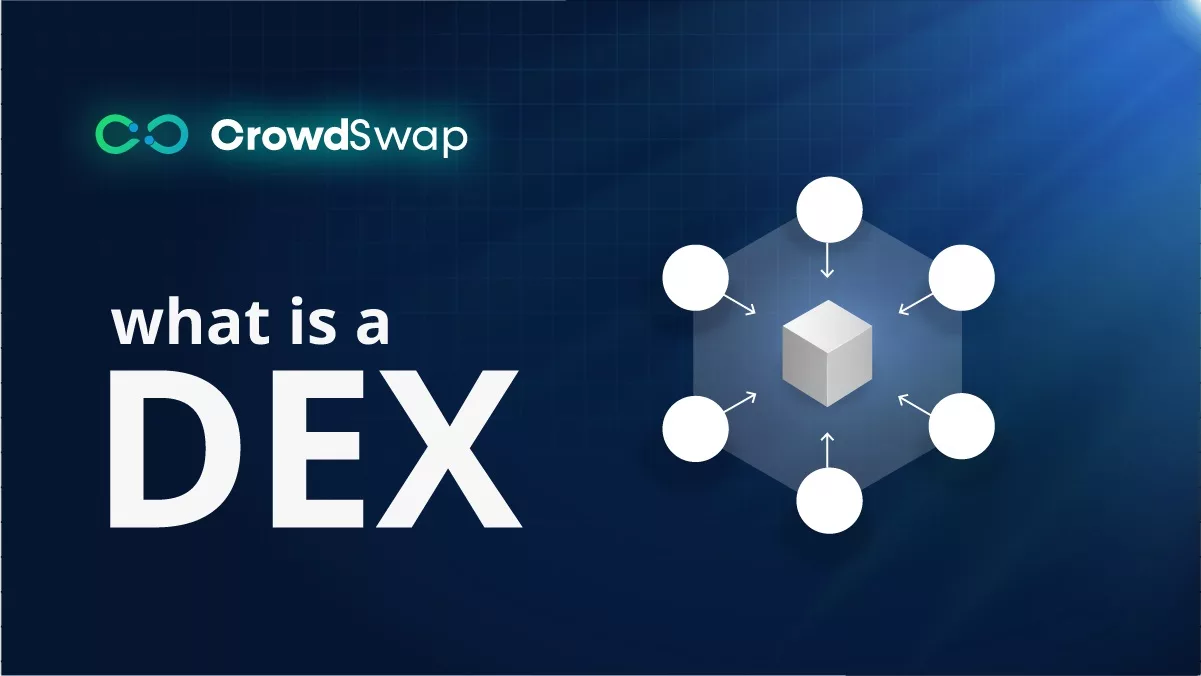In simple terms, a Decentralized Exchange, or DEX, is like an online marketplace for trading cryptocurrencies. Now, let’s delve deeper into “What is DEX?” and how it transforms the way we trade digital assets.
A DEX is an online platform where users can directly trade cryptocurrencies with one another, eliminating the need for a central authority or intermediary.
Imagine a virtual place where you can swap one cryptocurrency for another directly from your digital wallet without needing to trust a central entity to handle the exchange. That’s the essence of a DEX – putting you in control of your crypto trades in a decentralized and secure environment. It’s all about empowering users and promoting a more peer-to-peer approach to trading digital assets.
In the rest of the article, we will review the history of DEX, how it works, its advantages and disadvantages, and other details.
History of DEXs
For as long as humans have existed, trade and marketplaces have existed. From the barter system to the emergence of coins and paper-based currency traded in bazaars or intermediary institutions, we have always found a way to exchange goods and items of worth in some kind of physical location.
Today’s trading is undeniably influenced by cryptocurrency exchanges and has taken a surreal turn from what it was in the old times. Now blockchains inspired by the ideology of Bitcoin and Satoshi Nakamoto rule with an iron fist, upscaling and rendering traditional banking obsolete!
However, the first blockchain exchanges were not even close to the thought of “decentralized” as they required users to hand over their assets to the people or bodies in charge of the exchange – a soft betrayal in some of the original ideology believers.
Centralized exchanges (CEX) have been integral to the history of cryptocurrency trading, with one of the earliest platforms being Mt. Gox, which was established in July 2010. CEXs provided a convenient and accessible way for users to buy and sell cryptocurrencies, but their centralized nature posed inherent risks, such as security vulnerabilities and the need for users to trust the exchange with their funds. Over the years, high-profile hacking incidents and concerns about the mismanagement of user assets on some centralized platforms fueled a desire for alternative solutions. You can read more on the “What Is a CEX?” blog. The creation of decentralized exchanges (DEX) responded to these concerns, offering an environment where users maintain control of their private keys and trade directly from their wallets. The decentralized nature of “what is DEX” aligns with the principles of blockchain and cryptocurrency, providing increased transparency and reduced reliance on intermediaries. The development of DEX represents a paradigm shift in the cryptocurrency ecosystem, aiming to address the limitations associated with centralized exchanges and empower users with greater control over their assets.
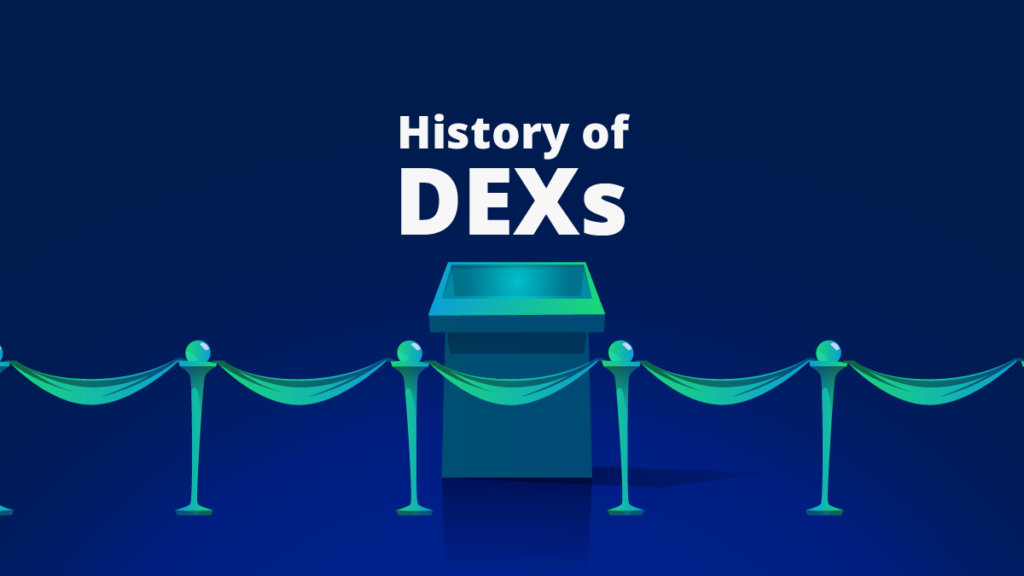
NXT is a blockchain platform that was introduced in late 2013 as one of the early cryptocurrencies. It serves not only as a digital currency but also as a platform for creating decentralized applications (DApps) and smart contracts. In 2014, NXT announced they wanted to run a decentralized exchange. After that, the Counterparty came up with their interpretation of what is DEX or decentralized exchange. Soon after, the evolution of the first generation of DEXs began in late 2016 and early 2017, upgrading their tools and tokens to help the unbanked and DeFi enthusiasts experience the true meaning of decentralized.
EtherDelta, launched in 2017, is considered one of the pioneering DEXs, utilizing Ethereum’s smart contracts for decentralized token trading. A smart contract is a self-executing digital contract with the terms of the agreement directly written into code, automating and enforcing the rules of a transaction on a blockchain. The concept gained momentum with the advent of Automated Market Makers (AMMs), a key innovation popularized by platforms like Uniswap in 2018 that facilitates decentralized token swaps through liquidity pools. Automated Market Makers (AMMs) are computer programs that automatically facilitate the trading of cryptocurrencies without relying on traditional buyers and sellers, using algorithms and liquidity pools to determine prices and execute transactions. A liquidity pool is a reserve of funds provided by users on a decentralized exchange, enabling smooth and instant transactions by allowing traders to buy and sell cryptocurrencies directly from the pool.
Since then, the DEX space has seen rapid growth and diversification, with various platforms introducing features like staking, yield farming, and advanced trading functionalities. Notable DEXs include SushiSwap, PancakeSwap, and Crowdswap, each contributing to the evolution of decentralized finance (DeFi) and offering alternatives to centralized exchanges. The history of “What is DEX?” reflects a continuous effort to enhance user control, security, and accessibility in the realm of cryptocurrency trading.
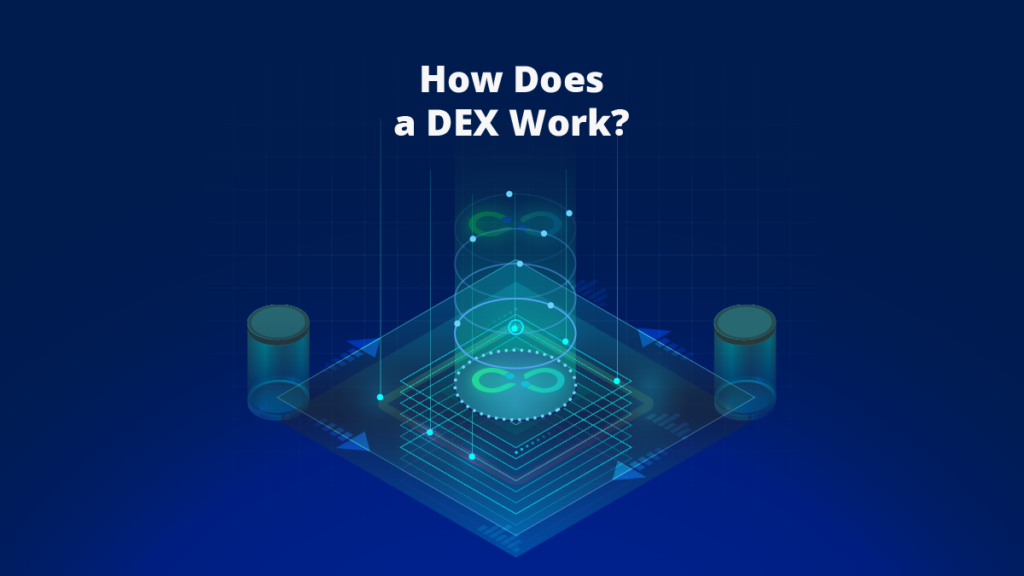
How Does a DEX Work?
In a DEX, the first step is for users to synchronize a digital wallet, such as MetaMask, with the platform. This wallet acts as their personal interface, allowing them to manage and control their cryptocurrency holdings securely. Once the wallet is connected, the decentralized exchange’s automated and coded smart contracts come into play, removing the need for direct communication between buyers and sellers.
These smart contracts are self-executing agreements written in code, automating the entire trading process. When a user initiates a trade by selecting a token pair they want to swap, the smart contract calculates the exchange rate based on the liquidity pool’s current state. This eliminates the traditional order book system found in centralized exchanges and replaces it with a transparent method.
The beauty of a DEX lies in its ability to facilitate peer-to-peer (P2P) transactions without the need for users to deposit their funds into a centralized wallet controlled by the exchange.
Instead, users retain ownership of their assets throughout the entire trading process. This enhances security and aligns with the decentralization ethos, providing users full control over their digital finances.
By streamlining the trading process through smart contracts and liquidity pools, DEXs empower users to engage in digital finance securely and seamlessly. This approach is particularly significant for the unbanked, offering them a platform to participate in financial activities without relying on traditional banking systems.
Different Types of Decentralized Exchanges
In the realm of cryptocurrency trading, understanding “What is DEX?” is pivotal for grasping the transformative nature of these platforms. There are three main types of DEXs, which are as follows:
- Automated Market Makers (AMMs)
Automated Market Makers (AMMs) are decentralized exchange mechanisms that use algorithmic formulas and liquidity pools to enable users to trade cryptocurrencies directly. In AMMs, users don’t rely on traditional order books; instead, they trade against these liquidity pools, and smart contracts automatically adjust prices based on the ratio of assets in the pool. This promotes a simplified and automated trading experience, with examples like Uniswap and PancakeSwap showcasing the AMM model in the decentralized finance (DeFi) space.
- Order Books
An order book is an electronic list of bids (purchases), offers (sells), and orders for an asset or other instrument organized by price level. Order books are used by almost every exchange to list the orders for different assets like stocks, bonds, currencies, and even cryptocurrencies like Bitcoin. In the context of decentralized exchanges, order books operate on the blockchain, allowing users to place and match orders in a transparent manner. Platforms like Kyber Network utilize decentralized order books to facilitate cryptocurrency trading.
- DEX Aggregators
Aggregators are platforms that enhance the trading experience by scanning multiple DEXs for the best prices. Instead of users manually checking various exchanges, aggregators like 1inch and Crowdswap streamline the process, providing optimal trade execution. They aggregate liquidity from different sources, offering users a comprehensive market view and ensuring efficient and cost-effective cryptocurrency trading within the decentralized ecosystem.
Read more: “What is the Difference between DEX aggregators and CEX aggregators?”
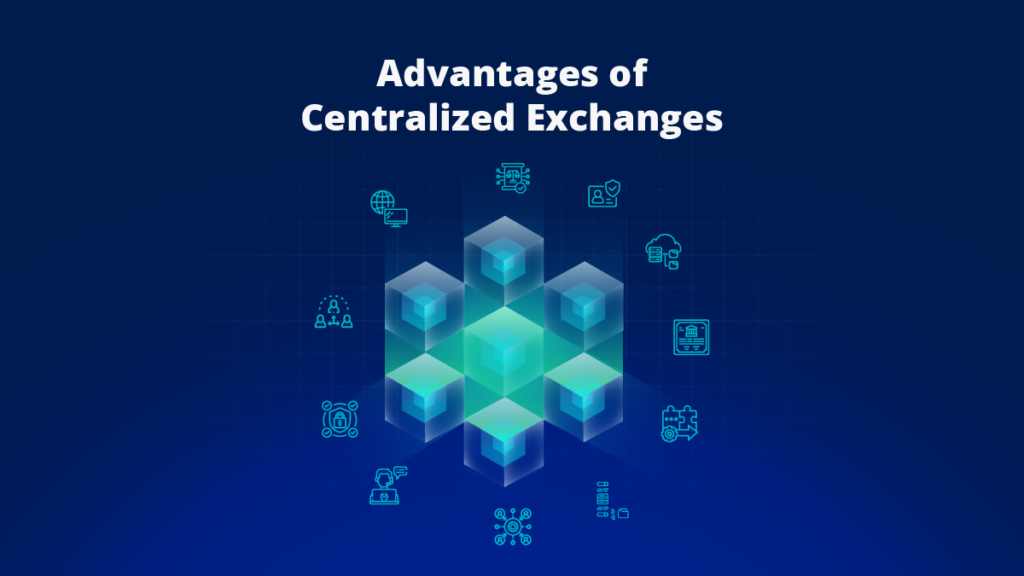
Advantages of Decentralized Exchanges
User Control
Users retain control of their private keys and funds, reducing the risk of hacks or mismanagement by the exchange.
Trustlessness
Users can trade directly from their wallets without the need to trust a centralized entity.
Privacy (No KYC needed)
DEXs often require minimal user information, providing a more private trading environment compared to centralized exchanges.
Resilience
The distributed nature of DEXs makes them less susceptible to censorship or regulatory interference.
Innovation and Diversity
The decentralized nature fosters innovation, leading to diverse DEX models and features catering to various user preferences.
Interoperability
With the rise of multi-chain DEXs, users can trade assets across different blockchain networks, promoting interoperability.
Reduced Counterparty Risk
Users trade directly with smart contracts, reducing the reliance on intermediaries and minimizing counterparty risk.
Liquidity Incentives
Liquidity providers are incentivized with fees, fostering the liquidity needed for efficient trading.
Inclusive Finance
DEXs provide financial services to the unbanked, enabling participation in the global financial system.
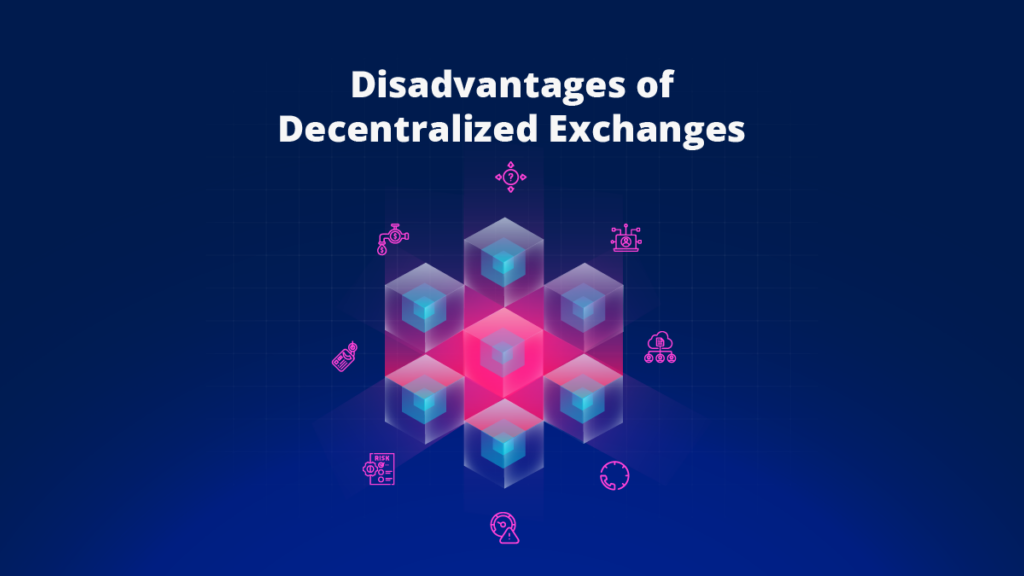
Disadvantages of Decentralized Exchanges
Liquidity
DEXs may face liquidity challenges compared to centralized exchanges, leading to wider spreads and potential trade slippage.
User Experience
The user interface and experience on some DEXs may be less intuitive or user-friendly compared to centralized exchanges, which could be a barrier for less tech-savvy users. CrowdSwap has tried to solve this problem by providing a simple and user-friendly design.
Speed and Efficiency
Decentralized exchanges may not offer the same speed and efficiency as centralized counterparts due to blockchain transaction confirmation times and the processing of smart contracts.
Regulatory Uncertainty
The regulatory environment for DEXs is still evolving, and uncertainties can affect their operations, leading to potential legal challenges.
Smart Contract Risks
While smart contracts automate transactions, they are not immune to vulnerabilities or bugs, which could lead to financial losses for users.
Security Concerns
While decentralized exchanges enhance security in many aspects, users are still susceptible to phishing attacks, malicious smart contracts, and vulnerabilities in the underlying blockchain technology.
Limited Customer Support
DEXs may lack traditional customer support structures found in centralized exchanges, making it challenging for users to seek assistance in case of issues.
Network Congestion
During periods of high demand or network congestion, transaction fees on DEXs can spike, affecting the cost-effectiveness of trading.
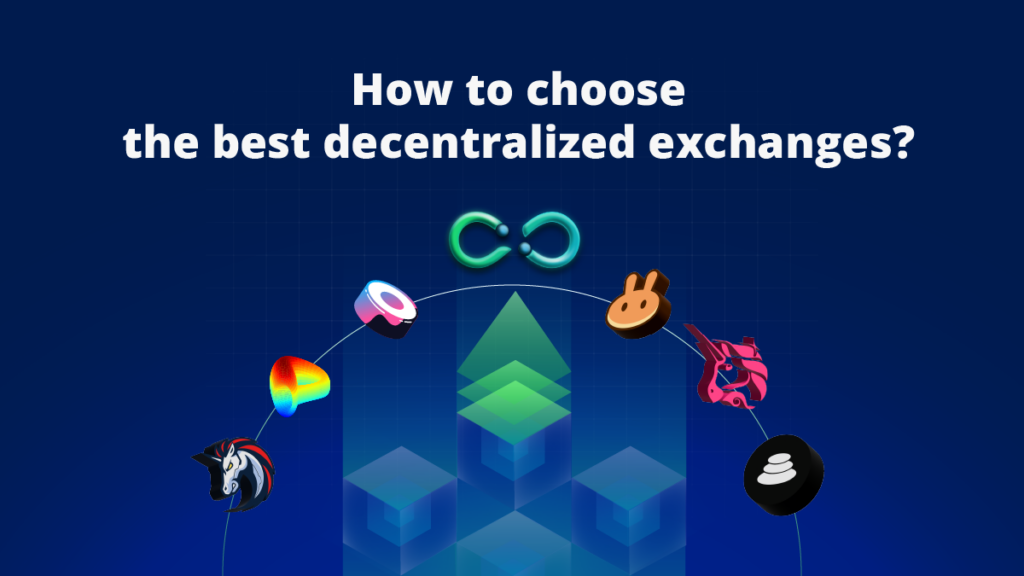
How to choose the best decentralized exchanges?
After reading up on “What is dex?”, the time has come to choose the right one. Many DeFi exchanges and platforms offer competitive options and costs, but not all can benefit you and your needs.
Choosing the best decentralized exchange involves considering factors like user interface, security features, available trading pairs, and transaction fees. Look for platforms with a user-friendly design, strong security measures, various supported cryptocurrencies, and competitive fees. Reading user reviews and staying updated on the latest developments in the decentralized exchange space can also help in making an informed decision. Always prioritize platforms that align with your specific trading needs and preferences.
For example, CrowdSwap finds the best routes and prices for swaps, crosschains, or other asset replacement features while providing yield farming and staking opportunities. Another DEX might not put much effort into tools and, instead, focus on its pools or vice versa. Finding the right one is key to your successful and memorable DeFi experience.
Trade Effortlessly
Ready to dive deeper? Our crypto exchange is simple and user-friendly, making trading a breeze
The Bright Horizon: Decentralized Exchanges in the Future of Finance
After examining the answer to the question “What is DEX?”, we come to this part of what will be its future. The future of decentralized exchanges (DEX) appears promising as the decentralized finance (DeFi) ecosystem continues to grow. With ongoing advancements in blockchain technology, DEXs will likely address current challenges such as liquidity and user experience. Increased interoperability across different blockchain networks, improved scalability solutions, and enhanced security measures are expected to boost decentralized exchanges’ overall efficiency and appeal. Additionally, DEXs may find clearer pathways for mainstream adoption as regulatory frameworks evolve. The push towards greater decentralization, user control, and inclusivity in the financial ecosystem positions DEXs as integral players in the future of global finance.
As a DEX aggregator, CrowdSwap takes pride in working hard to become the future of decentralized exchange and tackle the problems of this sector.
FAQ
What is a Decentralized Exchange or DEX in simple words?
A DEX is an online platform where users can directly trade cryptocurrencies with one another, eliminating the need for a central authority or intermediary.
What are the different types of Decentralized Exchanges?
Automated Market Makers (AMMs), Order Books, and DEX Aggregators.
What are the benefits of a DEX?
User Control, Trustlessness, Privacy (No KYC needed), Resilience, Innovation and Diversity, Interoperability, Reduced Counterparty Risk, Liquidity Incentives, Inclusive Finance.






